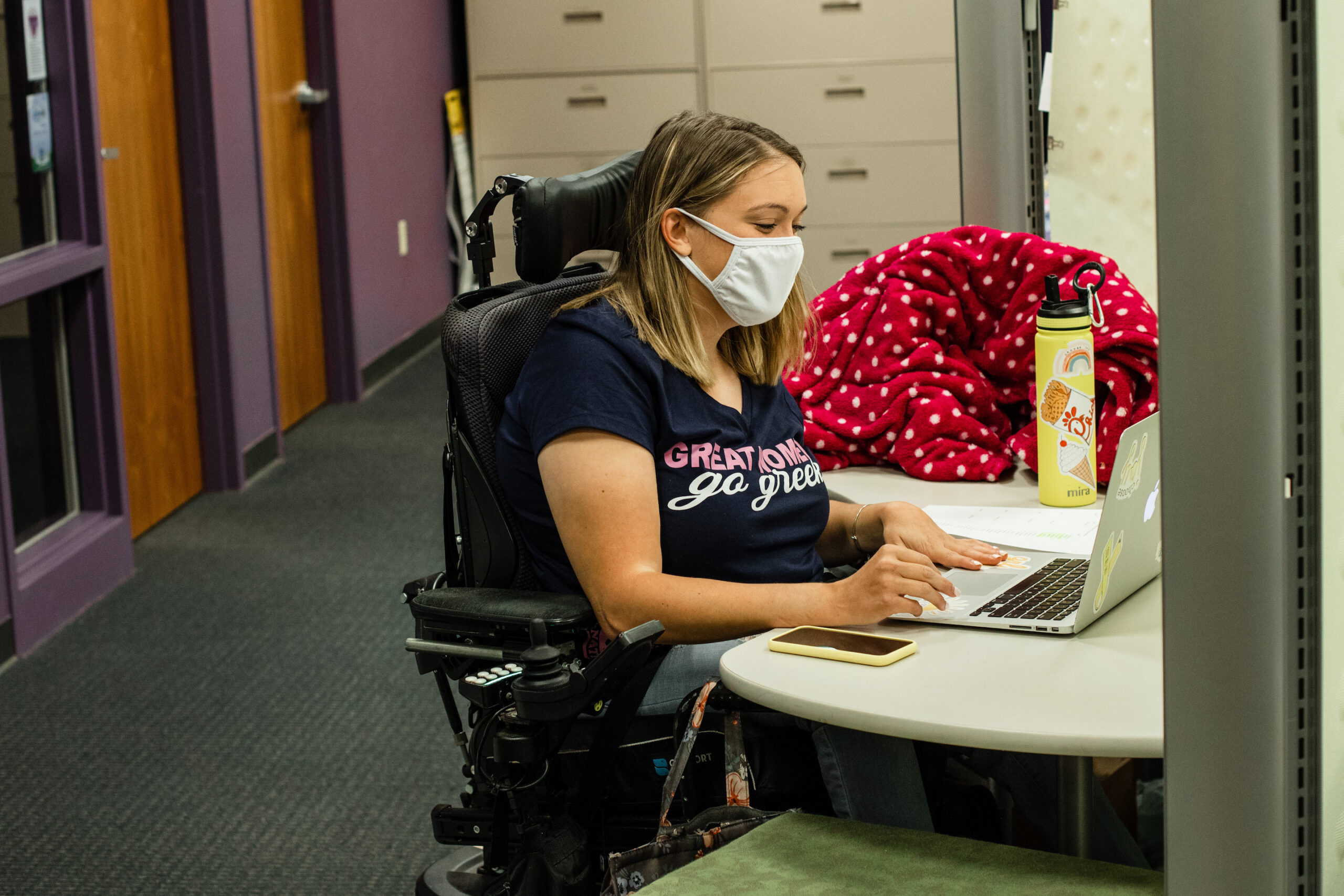
Working Student | Photo by Kayli Thompson | The Wright State Guardian
October marked the 75th anniversary of National Disability Employment Awareness Month (NDEAM). The month is meant to raise awareness of the needs of disabled workers, which have been complicated due to the coronavirus pandemic.
NDEAM
Senior Vocational Counselor Maggie Mejia, who works with Opportunities for Ohioans with Disabilities (OOD), first became aware of the month in 2016 through mass emails and communication within their job.
“I started working for the state in 2016 after I finished school,” said Mejia. “I work for the state agency. Their sole, primary purpose is to help Ohioans with disabilities get jobs. Pretty much every major disability-related calendar event is communicated throughout the agency, and we try to use that as a platform to really bump things up.”
The agency uses the event to excite employers to have more hiring fairs for those with disabilities.
Disability Specialist Evan Mason became aware of NDEAM as a student worker with the Office of Disabilities at Wright State University (WSU), though he did not have much to do with it until a year ago.
“This is really the first full month that I’ve been in a position to be able to act on it, so that’s been fun,” said Mason.
Helping students with disabilities
OOD prepares students who have disabilities with various workshops to help them perfect their resume and interviewing skills. These events are designed to assist the students in being hired.
“We’ve been coordinating with a federal program called the Workforce Recruitment Program, WRP for short. We’ve got contacts through Wright-Patterson Air Force Base, who we’ve been collaborating with to set up interviews to get people considered for government internships,” said Mejia. “I’ve been working with students to look through Handshake to apply for employment and future internships, and just constantly helping students with preparing for interviews with practice, mock interviewing, writing out elevator speeches, going over their resume, and really helping them to reach out and explore their network and form up references, people that will speak for them.”
Mason and Mejia have both been working with WRP, a program that helps disabled students get internships, often in the federal sector. Nearly all of those students are receiving internships at the Air Force Base or participating in a job related to the base. As part of WRP, Mason and Mejia are working to provide long-term career support to disabled students, starting conversations about where the students want to take their careers in the future.
“Our role is to help students connect with what’s out there, and what supports there are beyond Wright State,” said Mason.
Challenges due to the coronavirus pandemic
The coronavirus pandemic has made it difficult for students to find jobs and internships. One of those challenges, according to Mejia, is finding a job where the students can work remotely.
“Some students are just not comfortable physically going out into the workforce, and understandably so,” said Mejia. “[A challenge is] trying to find opportunities that are going to meet the health and safety needs of students. Not all job postings clearly say whether or not this can be worked from home.”
Another obstacle has been looking for internships and jobs that can help students achieve their financial goals.
“Some internships that used to be paid are no longer paid because funding has been cut, and employers are generally just trying to trim the fat and just capture and save as much money as they can,” said Mejia. “Unfortunately, new hires or temporary employees are not being compensated as they should.”
Mason and Mejia have been working on confirming new internships for the summer of 2021. The method of delivery for those internships is up in the air at this moment.
“Because we’re working so many months out, there’s a lot of questions about how these internships are even going to be delivered,” said Mason. “We don’t know if there’s going to be in-person options or if it’s going to be remote work.”
Mason sees a few benefits to working these internships remotely, including the location that the students can work.
“They’re not tied to only working at Wright-Patt if they’re going to be having remote-working options,” said Mason. “Some places out of the area that would be out of traditional driving distance for them would actually still be a viable option.”
Connecting with these students remotely is beneficial to workers like Mason and Mejia because they can demonstrate what they are discussing with students by using screen sharing during virtual meetings.
“That’s added a really nice layer that didn’t exist before this was commonplace,” said Mason.
As of 2019, the unemployment rate for those with disabilities is 7.3%, according to the Bureau of Labor Statistics.
“People with disabilities are still greatly underemployed or unemployed,” said Mejia. “You’ve got folks with potential who are not reaching their full potential, and so the idea is that people with disabilities are able to contribute to society and be self-reliant and work to their full potential, be able to be financially independent and not dependent on government benefits if they don’t need to be.”
